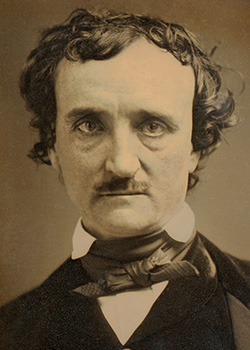“Sleep – those little slices of death – how I loathe them.” - Edgar Allan Poe 1809-1849
American author, Edgar Allen Poe, the inventor of the horror story, barely slept. Was it his vivid, ghoulish imagination that kept him awake? Perhaps the fear of being buried alive? His misshapen face and tired droopy eyes indicate a simpler explanation; that he was violently shaken awake by his own snoring.
Recently I was presenting workshops for dentists on sleep disorders and breathing dysfunction with dentist Dr Dan Hanson. He lectures internationally on facial development, breathing dysfunction and sleep disorders.
When he saw this photo of Edgar Allen Poe, he said; “This man has an underdeveloped upper jaw – look at the lack of cheek bones and severe asymmetry. See how the right side of his face being much larger than the left? These features correlate with breathing dysfunction, which affects tongue posture, which in turn affects growth of the upper jaw. Poe’s facial features are typical of people suffering from sleep disorders and it’s no wonder that he slept so badly.”
Apnoea is indeed a little slice of death. Poe would have stopped breathing often during the night, then “brought back to life” with a desperate gasp, a jagged, violent snoring. Poe died young – only 40 – but he needn’t have gone to his grave for a peaceful sleep. With what we know now, Poe could have simply been coached out of his nightly “deaths”.
Poe would be in good company today. A 2011 review for the Australian Sleep Foundation estimated that 1.5 million Australians have sleep disorders including snoring, sleep apnoea and insomnia. New Zealanders are similarly afflicted. And sleep issues start at a young age. According to a 2014 Auckland University survey nearly 40 per cent of their students had significant sleep problems.
If you snore, suffer from sleep apnoea, restless legs, insomnia or grind your teeth then you are likely to be sleep deprived. The simple act of getting a good night's sleep is central to good health and here are two important considerations:
- Sleep problems are often the result of a body in overdrive with the nervous system in an overactive state known as sympathetic dominance. It is like taking your work to bed when you should be putting the brakes on.
- If you have a sleep problem you may be breathing too much.
How often do you pause to think about your breathing? Breathing should always be through the nose and from the diaphragm. A good breathing rate is less than 15 breaths a minute. Breathing should be inaudible except during strenuous exercise. If you habitually breathe through your mouth by day you are almost certainly breathing too much. Frequent yawns, coughs, throat clearing, sighs or sniffs are typical signs of dysfunctional breathing. If you snore or suffer from sleep apnoea you are essentially hyperventilating (over-breathing) in your sleep. Dysfunctional breathing underpins most sleep disorders and the signs and symptoms are present day and night and can be readily identified in a breathing assessment.
Relearning how to breathe in a way that supports outstanding health can be game changing for restorative sleep. The key is restoring a functional day-time breathing pattern and that will carry over into night-time breathing.
Seven guidelines to start getting some productive shut eye.
- Try to breathe through your nose even during strenuous activities.
- Exercise is important but it must be restorative and not leave you exhausted. A good rule is to maintain a pace where nasal breathing is comfortable. And avoid strenuous exercise close to bedtime.
- Try not to eat a big meal close to be-time. Alcohol, caffeine and sugary foods and drinks will affect your sleep.
- Turn off all screen technologies by 9pm (earlier for kids). In an ideal world computers, tablets and phones are off one hour after dinner and TV one hour before bed.
- Avoid stimulating activities close to bed-time. A workout at 8 pm or hide and seek with the kids immediately before bed is toxic to good sleep.
- Keep the bedroom dark, well ventilated and not too warm. It is a good idea to avoid night lights and cover the LED screen on your alarm clock if necessary.
- Get some natural light each day. Get outside, summer and winter.
This article also appears on the Wellbeing Centre website
Sources:
Snoring and sleep apnoea are linked to increased risk of heart attack, stroke, cancer and cognitive decline including Alzheimer’s.
http://www.buteykobreathing.nz/blog/425061
http://www.buteykobreathing.nz/blog/sleep-apnoea-and-alzheimers.html
2015 UCLA study finds sleep deprivation accelerates ageing.
http://www.sciencedaily.com/releases/2015/06/150610131728.htm
According to the British Sleep Council, if you don’t sleep for at least six hours a night, you’re 12% more likely to die young. Lack of sleep can trigger a range of health problems. It can give you heart disease. It can give you diabetes. It can make you obese. It can ruin your concentration, your memory and your youthful good looks in one fell swoop.
http://www.theguardian.com/commentisfree/2015/aug/11/official-middle-aged-not-sleeping-rotting-government-campaign-sleep-deprivation-40-60
http://www.sleepcouncil.org.uk/



